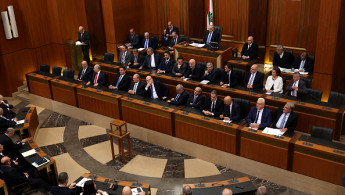Breadcrumb
Why were foreign dignitaries present at Lebanon's presidential election session?
Lebanon's presidential election session on Thursday saw a notable and significant presence of foreign dignitaries, following weeks of mounting international pressure to fill the country's two-year-long presidential vacuum.
The session, held in the Lebanese parliament, drew attention as diplomats from various nations arrived to observe the pivotal moment, amid hopes that the election will help alleviate Lebanon's political and economic crises.
Among the key figures present was French envoy Jean-Yves Le Drian, who joined the diplomatic gathering, which included US ambassador Lisa Johnson, British ambassador Hamish Cowell, Saudi ambassador Walid Boukhari and Iranian ambassador Mojtaba Amani among others.
The diplomats, invited by Speaker Nabih Berri, appeared as part of efforts to garner international support and legitimacy for the election. However, for some, their presence signalled concerns over foreign intervention and pressure exerted on MPs to elect a president despite contention over the candidates.
It has long been an open secret in Beirut's political circles that Washington had wanted army chief General Joseph Aoun, to fill the presidential post, with Jihad Azour, a senior banker at the International Monetary Fund, considered a second pro-US candidate.
Thursday's session eventually saw the election of Aoun as Lebanon's 14th president. However, the first round of elections earlier that day had failed to gain the majority votes required for him to win.
Some MPs - likely to have been from the Free Patriotic Movement who had opposed Aoun's nomination - had filled their ballot papers with slogans such as "sovereignty and the constitution", in reference to external pressures leading to Aoun's election despite the constitution prohibiting public servants, including members of the military, from running for office while still in service.
Similarly, MPs from Hezbollah and the Amal Movement were likely to have avoided voting for Aoun in the first round.
One of the voided ballots had the name of Saudi envoy Yazid bin Al-Farhan, who had arrived in Beirut on Wednesday after the Gulf country recently tied hundreds of millions of dollars to Lebanon if Aoun was elected.
Another ballot paper had "Joseph Amos bin Farhan" written on it - a play on the names of General Joseph Aoun, US envoy to Lebanon Amos Hochstein, and Saudi envoy Walid bin Farhan.
Whether the presence of foreign dignitaries at the session played a pivotal role or not, Aoun was elected in the second round of voting, securing 99 out of 128 votes surpassing the required two-thirds majority, seemingly after Amal and Hezbollah MPs gave the green light.
US Ambassador Johnson said she was "very happy" with Aoun's election, pledging to work "closely" with the new president.
French President Emmanuel Macron posted on X: "Congratulations to President Joseph Aoun for this crucial election. It paves the way for reforms, the restoration of sovereignty and the prosperity of Lebanon. Lebanon, France is by your side."
Iran too welcomed Aoun's election, hoping that the two nations would cooperate to serve their "common interests", according to a message from the Iranian embassy in Lebanon posted on X.
"We congratulate brotherly Lebanon on the election of General Joseph Aoun as President of the Republic (and) we look forward (...) to cooperating in different areas in a way that serves the common interests of our countries," the Iranian mission in Beirut said.
Israeli Foreign Minister Gideon Saar also congratulated Lebanon, posting on X that he hoped Aoun's election would contribute towards "stability" and "good neighbourly relations".
Israel dramatically escalated a low-level conflict with Lebanon into a full-scale war last September, killing thousands of people and forcing over a million more to flee their homes. It still occupies parts of southern Lebanon despite a ceasefire reached in November.






![Anthony Blinken speech [Getty] Anthony Blinken speech [Getty]](/sites/default/files/styles/image_684x385/public/media/images/6263436E-8ACD-4D3C-9055-25A7BE79DD5A.jpg?h=d1cb525d&itok=fLHmHCRG)
 Follow the Middle East's top stories in English at The New Arab on Google News
Follow the Middle East's top stories in English at The New Arab on Google News
![Gaza death toll [Getty]](/sites/default/files/styles/image_330x185/public/2192491071.jpeg?h=a5f2f23a&itok=1V9vL9X5)
![Koutoubia Mosque, Marrakech [Getty/file photo]](/sites/default/files/styles/image_330x185/public/599585491.jpeg?h=ccb8d0fb&itok=Ov05vBAW)
![Italy FM Tajani [Getty]](/sites/default/files/styles/image_330x185/public/2192496012.jpeg?h=a5f2f23a&itok=W1iS7P4X)